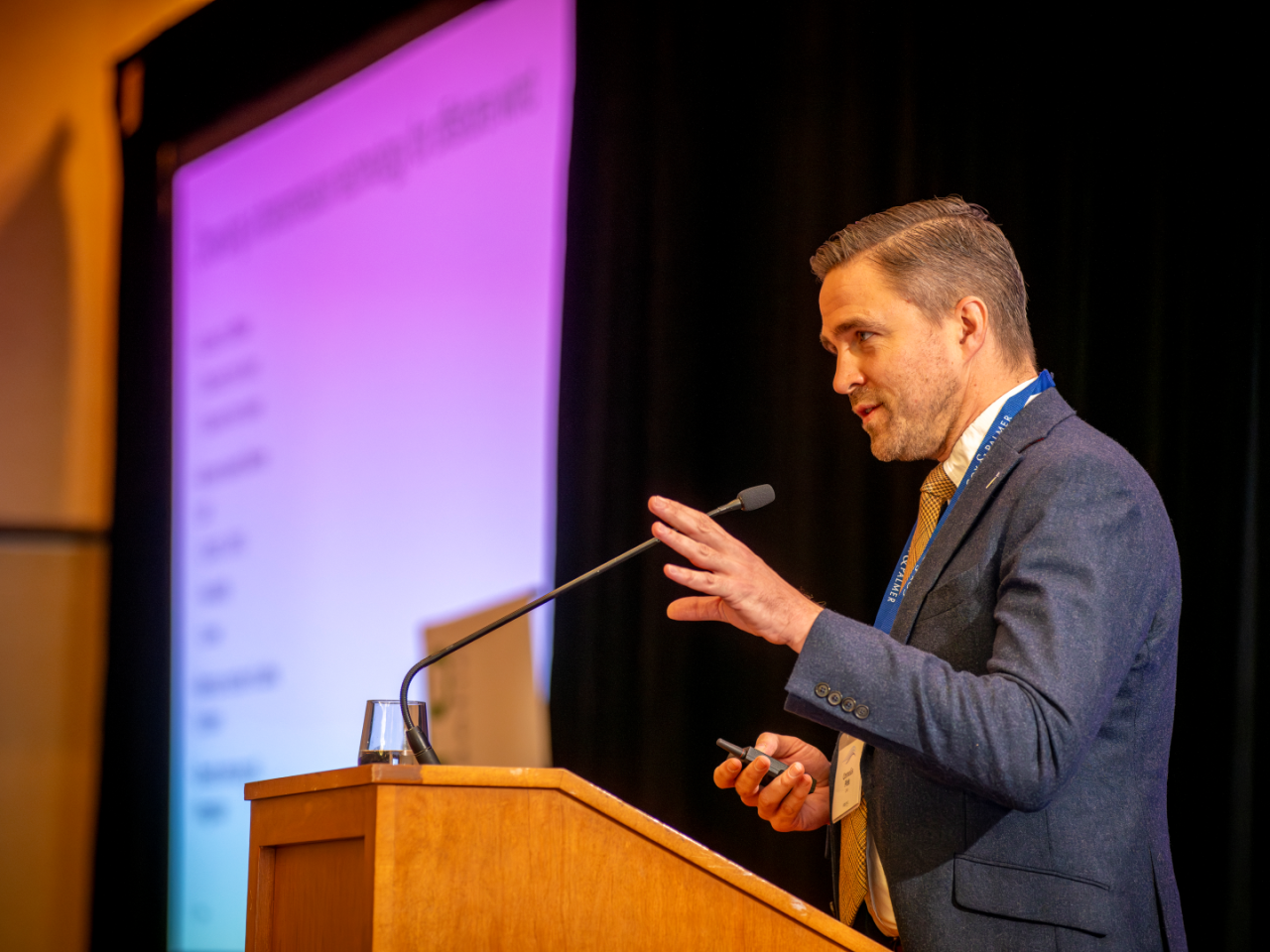
Presented by the Energy Modelling Hub and Net Zero Atlantic
The Energy Modelling Hub and Net Zero Atlantic invite you to participate in the 3rd Atlantic Canadian Conference on Energy System Modelling. This one-day event will feature discussions on themes of innovation and interprovincial collaboration to strengthen Atlantic Canada’s energy grid.

Conference Overview
The Atlantic Canadian Conference on Energy System Modelling offers a unique opportunity for stakeholders in the energy system transition to share technical findings and discuss further research of local importance. Delegates can look forward to exploring how modelling can help us shape a sustainable and inclusive energy future for Atlantic Canada. We look forward to learning and connecting with you.
When: Wednesday, June 18, 2025, 8:30AM - 7:00PM AT
Where: The Westin Nova Scotian ┃ 1181 Hollis St, Halifax, NS B3H 2P6
Why Attend?
- Gain insights from regional and national experts on energy modelling challenges and opportunities.
- Explore how innovation and interprovincial collaboration can shape a reliable and affordable grid.
- Participate in four panel sessions, a keynote presentation, and a networking reception.
- Access discussions on regional challenges, trade barriers, and actionable energy policies.
- Enjoy breakfast, lunch, and refreshment breaks while connecting with industry peers.
Who Should Attend?
- Policymakers seeking data-driven insights to inform decisions.
- Energy modellers translating complex models into actionable policies.
- Industry leaders navigating regional energy challenges and market opportunities.
- Academics and researchers exploring cutting-edge methodologies.
- Students interested in the latest developments in energy system modelling.

Registration News - Group Discount Available
Bring your team or register as an individual. The conference is a unique opportunity to take part in the conversation shaping Atlantic Canada's energy future. To make way for teams to register, we are providing a group discount. Details are below.
If cost is a barrier to participation, please contact us at events@netzeroatlantic.ca to discuss your needs.
As a delegate you will have access to the conference sessions and a networking reception, as well as breakfast, lunch, and refreshment breaks.
Passes, Special Rates and Fees*
- Conference Day Pass - $255
- Group Discount - 4 delegates for the cost of 3
- Early Bird Conference Day Pass - $230 (CLOSED MAY 9)
- Special Westin Nova Scotian rates - $239.00 to $249.00 (CLOSED MAY 16)
*Ticket prices do not include taxes or Eventbrite fees.
The conference location and recommended hotel is The Westin Nova Scotian.
If your organization would like to be invoiced for conference day passes, please email your request to events@netzeroatlantic.ca
Media Accreditation
Media passes are available for qualified media.
For accreditation, contact Kasia Morrison, Communications & Engagement Lead: kmorrison@netzeroatlantic.ca.
Cancellation Policy
No refunds available.
If you are unable to attend, you may transfer your registration to a colleague. For changes, contact events@netzeroatlantic.ca.
No Invitation Letters Provided
The conference does not provide invitation letters for international registrants. Attendees from outside Canada must secure travel visas independently.

Program
We have one dedicated day to gain insights from regional and national experts on energy modelling challenges and opportunities. The panel themes and key topics will give you a sense of the innovation and interprovincial collaboration to be discussed as well as the on regional challenges, barriers, and actionable policies.
BROWSE THE PROGRAM BELOW
Agenda at a Glance
Wednesday, June 18, 2025 (8:30AM - 7:00PM)
|
Time |
Session |
|
8:30 AM – 9:00 AM |
Registration |
|
9:00 AM – 9:10 AM |
Welcome & Opening Remarks |
|
9:10 AM – 10:40 AM |
Panel 1: Bridging the Provinces – Strengthening Interprovincial Energy Modelling Collaboration |
|
10:40 AM – 10:50 AM |
Governance for Data That Matters: Launching the Energy Data Trust |
|
10:50 AM – 11:05 AM |
Break |
|
11:05 AM – 12:35 PM |
Panel 2: The Role of Buildings and Transportation in a Resilient and Affordable Energy System |
|
12:35 PM – 1:25 PM |
Lunch |
|
1:25 PM – 1:50 PM |
Poster Presentation Pitches |
|
1:50 PM – 2:00 PM |
Report Launch: Mitigating Winter Peak Demand in a Decarbonizing Atlantic Canada: Exploring the Role of Hybrid Heating |
|
2:00 PM – 3:30 PM |
Panel 3: Advancing Energy Modelling – Enhancing Accuracy, Resilience, and Policy Integration |
|
3:30 PM – 3:45 PM |
Break |
|
3:45 PM – 5:15 PM |
Panel 4: Strengthening the Modelling-Policy Nexus – Turning Insights into Action |
|
5:15 PM – 5:20 PM |
Conclusion |
|
5:20 PM – 7:00 PM |
Cocktail Reception |
Panel 1: Bridging the Provinces – Strengthening Interprovincial Energy Modelling Collaboration
Canada’s clean electricity future requires better interprovincial coordination, yet trade barriers, infrastructure gaps, and misaligned policies create bottlenecks. This panel will explore how energy modelling can help identify solutions, optimize transmission planning, and facilitate regional collaboration.
Key Topics:
• Interprovincial electricity trade barriers – regulatory harmonization and market integration
• Strengthening regional transmission planning – optimizing interconnections through modelling
• Data standardization and transparency – ensuring comparability across provincial models
• Offshore wind and large-scale renewables integration – interprovincial synergies
• Lessons from successful cross-border collaborations (e.g., US - Canada energy trade)
Speakers:
Moderator: Michael Bourque, Innovation Director - University of New Brunswick
Bojana Zindovic, Managing Consultant, Electricity Regulation & Market Design - ELIA GRID INTERNATIONAL (bio link)
- Presentation Title: Harnessing European Insights: Bridging Provinces with Hybrid Offshore Wind Interconnectors and Energy Islands (presentation)
Elizaveta Kuznetsova, PhD, Head of Energy Value Chains - ESMIA Consultants (bio link)
- Presentation Title: Impacts of the Clean Electricity Regulations (CER) on Energy Affordability and Interprovincial Trade in the Atlantic Provinces (presentation)
Frédéric Côté, MBA, General Manager - Nergica & Canadian Lead for the Northeast Grid Planning Forum (bio link)
- Presentation Title: Powering Progress Together: Unlocking Transmission Opportunities Across Provincial and International Borders in the Canadian-American Northeast (presentation)
Kevin Sherd, Lead Engineer, Transmission Assessments - North American Electric Reliability Corporation (NERC) (bio link)
- Presentation Title: Exploring the Role of Transfer Capability: Findings from NERC’s Canadian Analysis (presentation)
Panel 2: The Role of Buildings and Transportation in a Resilient and Affordable Energy System
As the transition to electric heating and transport accelerates, the grid must adapt to shifting demand profiles. How can energy models help prepare for these changes, ensuring system reliability and cost-effectiveness?
Key Topics:
• Electrification’s impact on demand – modelling peak load shifts from EVs and heat pumps
• Vehicle-to-grid (V2G) and flexible demand – leveraging EVs as grid assets
• Smart buildings and energy efficiency – reducing demand and enhancing grid flexibility
• Sector coupling – integrating hydrogen, biofuels, and industrial decarbonization strategies
• Weather-driven demand variations – improving resilience in infrastructure planning
Speakers
Moderator: Kathleen Mifflin, Senior Research Associate - Canadian Climate Institute
Léa Simon de Kergunic, Senior Analyst - Dunsky Energy + Climate Advisors (bio link)
- Presentation Title: Modeling the Impact of Rebates and Other Key Drivers on EV Adoption (presentation)
Florian Mitjana, Postdoctoral Researcher, Decarbonization of the Electricity System and Machine Learning - HEC Montreal (bio link)
- Presentation Title: Choices and Uncertainties in Planning for Net-Zero Power Systems: Shaping Demand Through Energy Efficiency to Lower System Cost (presentation)
Dr. Kuljeet S. Grewal, Assistant Professor in Sustainable Design Engineering - University of Prince Edward Island (bio link)
- Presentation Title: Neighborhood-Scale Energy Modeling and Planning for Net-Zero Transitions
Wayne Groszko, Applied Energy Research Scientist - Nova Scotia Community College (bio link)
- Presentation Title: Modelling of Heat Pumps with Phase Change Thermal Energy Storage for Residential Heating Demand Response (presentation)
Panel 3: Advancing Energy Modelling – Enhancing Accuracy, Resilience, and Policy Integration
Energy models must adapt to capture renewable variability, system shocks, and sectoral shifts. This panel will explore cutting-edge advancements that enhance model accuracy, system resilience, and policy integration.
Key Topics:
• Modelling renewable energy variability – improving intra-hour and seasonal projections
• Large industrial loads (e.g., hydrogen, data centers, mining) – how to integrate into system planning
• Grid-forming inverters and high-renewables grid stability – technical and modelling challenges
• Extreme weather, cyber threats, and system shocks – resilience in modelling
• Multi-model comparisons – cross-validation for better policy confidence
Speakers:
Moderator: Normand Mousseau, Scientific Director - Institut de l'énergie Trottier
Chris Milligan, Director, System Planning & Grid Integration - Nova Scotia Power (bio link)
- Presentation Title: Enhancing Accuracy, Resilience, and Policy Integration (presentation)
Cameron Wade, Founder and Principal - Sutubra Research (bio link)
- Presentation Title: Evaluating the Potential of Long-Duration Energy Storage in Nova Scotia's Clean Energy Transition (presentation)
Steven Wong, Senior Technical Advisor, Renewable Energy Integration - CanmetENERGY/Natural Resources Canada (bio link)
- Presentation Title: Capabilities, limitations, and Future Role of Grid Forming Inverters (presentation)
Barbar Moawad, Delivery Lead, ElectrifiedGrid | Sustainability, Decarbonization, and Energy Transition Manager - Deloitte (bio link)
- Presentation Title: Navigating Electrification Uncertainty: Turning Advanced Modeling into Actionable Insights for Grid Operators (presentation)
Panel 4: Strengthening the Modelling-Policy Nexus – Turning Insights into Action
Despite advancements in energy modelling, a gap remains between technical insights and real-world policy implementation. How can we better connect models to decision-making processes?
Key Topics:
• Best practices for modeller-policymaker engagement – ensuring actionable insights
• Case studies of models shaping policy – successes, failures, and lessons learned
• Bridging the gap between model outputs and regulatory decisions
• Simplifying complex modelling results for policymakers and industry stakeholders
Speakers:
Moderator: Lana Asaff, Senior Economist - Atlantic Economic Council
Michelle Siscoe, Director, Net Zero Program & Business Transformation Office - Saint John Energy (bio link)
- Presentation Title: Aligning Energy Modelling with Municipal Utility Decisions: The SJE Zero30 Case (presentation)
David Foord, Associate Professor - University of New Brunswick (bio link)
- Presentation Title: Energy Modelling & Policy Insights Barometer (presentation)
Maria Scheller, Vice President - ICF International (bio link)
- Presentation Title: Holistic Energy Resource Optimization – A New Paradigm to Inform Planning Decisions (presentation)

Poster Presentations
This year’s poster presentations highlight a range of research and applied work advancing energy system modelling across the region. Below is a list of presenters and their project titles, representing contributions from academia, industry, and independent researchers.
Mostafa Mostafavi Sani, Dalhousie University
The Role of Long-Term Hydrogen Storage in Decarbonizing Remote Communities in Canada.
Adango Miadonye, Cape Breton University
Effect of Methane Gas Hydrate Content of Marine Sediment on Ocean Wave Induced Oscillatory Excess Pore Water Pressure and the Geotechnical Implications
Jacob Thompson, Wiwasolvet Total Primary Energy Solutions
Nova Scotia’s Long Duration Energy Storage, Sector-Coupling Hydrogen, Captured Waste Heat, and 100% Renewables Total Primary Energy Supply
Javier Ojeda, HYSOVENT Sustainable Engineering
Combined Hydro, Wind and Solar Feasibility Study using RETScreen - Nova Scotia Case Study
Sujoy Barua, St-Mary University
Hydrogen via Ammonia from Building Wastewater: A Theoretical Study
Caleb Stairs, Carleton University
Evaluating the Role of Industrial Electrification in Decarbonizing New Brunswick: Results of a New Capacity Expansion Model
Zackaria Kabore, Moncton University
Preparation and characterization of a transparent photovoltaic solar cell with chloroaluminium phthalocyanine (ClAlPc) et du fullerene (C60) as active materials
Ali Mahmoudi, Dalhousie University
Future Alternatives for Urban Transportation with Hydrogen, Electric, and Diesel Buses: A Comprehensive Life Cycle Analysis with Machine-Learning
Marcos Casimirri, CBCL
Leveraging ASHRAE 14 Guidelines for Robust Building Energy Modeling/Computer Simulation and Decarbonization Strategies.
Mehrnaz Ahmadi, Dalhousie University
Dynamic Energy Dispatch in Microgrids Using Deep Reinforcement Learning and Graph-Based Synthetic Inertia Control
Noushad Ahamed Chittoor Mohammed, University of Prince Edward Island
From Drones to Energy Models: Rapid Energy Modeling Workflow for Sustainable Neighborhoods
Kanwarpartap Gill, University of Prince Edward Island
Sustainable Solar Potential Assessment of Urban Neighborhoods Using Real Time Building Archetypes
Nicholas Legge, Dalhousie University
Assessing Long Duration Energy Storage Options for Nova Scotia's Energy Transition

